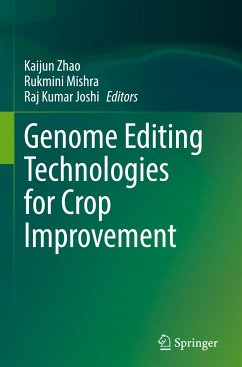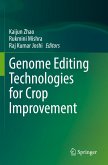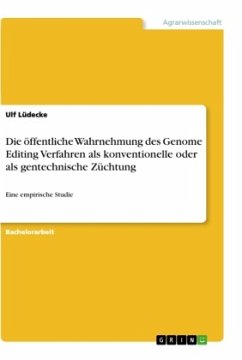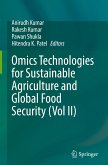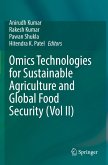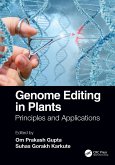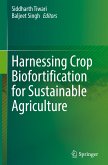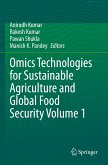Genome Editing Technologies for Crop Improvement
Herausgegeben:Zhao, Kaijun; Mishra, Rukmini; Joshi, Raj Kumar
Genome Editing Technologies for Crop Improvement
Herausgegeben:Zhao, Kaijun; Mishra, Rukmini; Joshi, Raj Kumar
- Gebundenes Buch
- Merkliste
- Auf die Merkliste
- Bewerten Bewerten
- Teilen
- Produkt teilen
- Produkterinnerung
- Produkterinnerung
This book compiles the relevant information related to genome editing tools and their roles in crop improvement. The book contains a brief introduction about various genome editing tools and their application in major crops. It discusses the genome editing approaches and the strategies used for genome editing in different crops. Some of the chapters cover the detailed methodology of sgRNA design, vector construction and transformation in different crops followed by data analysis. A few chapters focus on the applications of genome editing tools towards crop improvement. This book will be of…mehr
Andere Kunden interessierten sich auch für
![Genome Editing Technologies for Crop Improvement Genome Editing Technologies for Crop Improvement]() Genome Editing Technologies for Crop Improvement97,99 €
Genome Editing Technologies for Crop Improvement97,99 €![Die öffentliche Wahrnehmung des Genome Editing Verfahren als konventionelle oder als gentechnische Züchtung Die öffentliche Wahrnehmung des Genome Editing Verfahren als konventionelle oder als gentechnische Züchtung]() Ulf LüdeckeDie öffentliche Wahrnehmung des Genome Editing Verfahren als konventionelle oder als gentechnische Züchtung42,95 €
Ulf LüdeckeDie öffentliche Wahrnehmung des Genome Editing Verfahren als konventionelle oder als gentechnische Züchtung42,95 €![Omics Technologies for Sustainable Agriculture and Global Food Security (Vol II) Omics Technologies for Sustainable Agriculture and Global Food Security (Vol II)]() Omics Technologies for Sustainable Agriculture and Global Food Security (Vol II)112,99 €
Omics Technologies for Sustainable Agriculture and Global Food Security (Vol II)112,99 €![Omics Technologies for Sustainable Agriculture and Global Food Security (Vol II) Omics Technologies for Sustainable Agriculture and Global Food Security (Vol II)]() Omics Technologies for Sustainable Agriculture and Global Food Security (Vol II)112,99 €
Omics Technologies for Sustainable Agriculture and Global Food Security (Vol II)112,99 €![Genome Editing in Plants Genome Editing in Plants]() Genome Editing in Plants174,99 €
Genome Editing in Plants174,99 €![Harnessing Crop Biofortification for Sustainable Agriculture Harnessing Crop Biofortification for Sustainable Agriculture]() Harnessing Crop Biofortification for Sustainable Agriculture149,99 €
Harnessing Crop Biofortification for Sustainable Agriculture149,99 €![Omics Technologies for Sustainable Agriculture and Global Food Security Volume 1 Omics Technologies for Sustainable Agriculture and Global Food Security Volume 1]() Omics Technologies for Sustainable Agriculture and Global Food Security Volume 1112,99 €
Omics Technologies for Sustainable Agriculture and Global Food Security Volume 1112,99 €-
-
-
This book compiles the relevant information related to genome editing tools and their roles in crop improvement. The book contains a brief introduction about various genome editing tools and their application in major crops. It discusses the genome editing approaches and the strategies used for genome editing in different crops. Some of the chapters cover the detailed methodology of sgRNA design, vector construction and transformation in different crops followed by data analysis. A few chapters focus on the applications of genome editing tools towards crop improvement. This book will be of particular interest to plant biologists working in the field of genome editing and crop breeders. It will provide valuable information and useful material for our readers' experimental work.
Produktdetails
- Produktdetails
- Verlag: Springer / Springer Nature Singapore / Springer, Berlin
- Artikelnr. des Verlages: 978-981-19-0599-5
- 1st edition 2022
- Seitenzahl: 460
- Erscheinungstermin: 2. August 2022
- Englisch
- Abmessung: 241mm x 160mm x 29mm
- Gewicht: 935g
- ISBN-13: 9789811905995
- ISBN-10: 9811905991
- Artikelnr.: 63353927
- Herstellerkennzeichnung Die Herstellerinformationen sind derzeit nicht verfügbar.
- Verlag: Springer / Springer Nature Singapore / Springer, Berlin
- Artikelnr. des Verlages: 978-981-19-0599-5
- 1st edition 2022
- Seitenzahl: 460
- Erscheinungstermin: 2. August 2022
- Englisch
- Abmessung: 241mm x 160mm x 29mm
- Gewicht: 935g
- ISBN-13: 9789811905995
- ISBN-10: 9811905991
- Artikelnr.: 63353927
- Herstellerkennzeichnung Die Herstellerinformationen sind derzeit nicht verfügbar.
Professor Kaijun Zhao obtained his Ph.D. from the Graduate School of Chinese Academy of Agricultural Sciences (CAAS) majoring in plant genetics and breeding. He conducted postdoctoral researches in the Department of Botany at The University of Hong Kong, where he experienced intensive researches on plant molecular biology. Since 2000 he led his own research group at Institute of Crop Science, CAAS in China. Kaijun's laboratory is mainly interested in the molecular mechanisms of rice-pathogen interaction and consequently developing resources for rice breeding. He and colleagues cloned the prestigious rice bacterial blight resistance gene Xa23 which has been widely used in rice breeding programs and brought billions of benefits to farmers in China and beyond. Since 2010, Kaijun's laboratory has been focused on application of genome editing technologies for rice improvement. Based on investigations on the transcription activator-like effector AvrXa23, the lab has developed a simplified method for assembly of TALENs. Meanwhile, the lab has also established the CRISPR-Cas9 system for plant genome editing, which has been successfully adopted for improvement of rice resistance to diseases, rice grain yield and quality. Kaijun is the recipient of several prestigious awards such as Outstanding Scientific and Technological Innovation Award of CAAS, First Prize of China Agricultural Science & Technology Award and First Prize of DBN Science & Technology Award. Prof. Zhao has published more than 130 research papers and serves in the editorial board of several plant biotechnology journals. He was the liaison Scientist of International Rice Research Institute (IRRI) and currently serves as a Member of PROGRAMME ADVISORY COMMITTEE (PAC), MPOB, Malaysia. Dr. Rukmini Mishra currently serves as Associate Professor and Head in the Department of Botany, School of Applied Sciences, Centurion University of Technology and Management, Odisha, India where she teaches graduate level courses in Plant Genomics and Biotechnology. She is also the coordinator of the Centre for Genetics and Genomics and in this capacity supervises the overall research related to plant genomics, next generation sequencing and data analysis. Dr. Mishra has a PhD in Agricultural Biotechnology from National Rice Research Institute (NRRI-ICAR), India. She is the recipient of the prestigious SERB Young Scientist project Award and SERB Power grant from the Dept. of Science & Technology, Govt. of India and the Talented Young Scientist Fellowship under the TYSP programme of the Ministry of Science and Technology, Govt. of China. Her research primarily focuses on molecular marker development and CRISPR/Cas9 based genome editing towards development of resistance against fungal phytopathogens in rice, pepper and other crop species. She has published more than 30 research articles in journals of international repute. Raj Kumar Joshi currently serves as Associate Professor and Head of the Dept. of Biotechnology, Rama Devi Women's University, India where he teaches graduate level courses on Plant Genomics and Genetic Engineering. He also serves as the Group Leader of the Plant Functional Genomics Group, and in that capacity supervises the overall research activities on the functional aspects of molecular plant-microbe interactions. He has been awarded with the prestigious SERB early career grant and SERB extramural grant from the Dept. of Science and technology, Govt. of India and CREST award from Dept. of Biotechnology, Govt. of India. Dr. Joshi is currently running a successful programme on the delineation of molecular genetic networks in the interaction between plants and fungal phytopathogens. The crop of interest includes Capsicum annuum and Allium cepa. His recent forays into genome editing and precise base editing towards improvement of these crops has been highly productive. Dr. Joshi has published more than 60 research papers and serves in the editorial board of many prestigious plant biotechnology journals
PART I: INTRODUCTION TO GENOME EDITING AND CROP IMPROVEMENT.- Chapter 1. Genome editing is revolutionizing crop improvement.- PART II: GENOME EDITING TOOLS AND APPROACHES.- Chapter 2. Genome editing tools for food security.- Chapter 3. CRISPR/Cas9 based multi-gene editing in crops.- Chapter 4. CRISPR/Cas9 tool kit for multiplex genome editing in crops.- Chapter 5. Plant genome editing mediated by CRISPR/Cas12a system.- Chapter 6. Genome editing in crops via homology-directed repair using a gemini-virus based CRISPR/Cas9 system.- Chapter 7. Targeted gene replacement in plants using CRISPR-Cas technology.- Chapter 8. Expanding the scope of base editing in crops using Cas9 variants.- Chapter 9. Plant precise genome editing using prime editors.- Chapter 10. Off-target effects of crop genome editing and its minimization.- PART III: GENOME EDITING TOWARDS CROP IMPROVEMENT.- Chapter 11. Genome editing towards rice improvement.- Chapter 12. Genome editing for wheat Improvement.- Chapter 13. Genome editing for maize Improvement.- Chapter 14. Genome editing for Sorghum improvement.- Chapter 15. Accelerating Cereal breeding for disease resistance through CRISPR/Cas9 mediated genome editing.- Chapter 16. Genome editing for Soybean improvement.- Chapter 17. Genome editing for improvement of oil seed crops.- Chapter 18. Genome editing for potato improvement.- Chapter 19. Genome editing for tomato improvement.
PART I: INTRODUCTION TO GENOME EDITING AND CROP IMPROVEMENT.- Chapter 1. Genome editing is revolutionizing crop improvement.- PART II: GENOME EDITING TOOLS AND APPROACHES.- Chapter 2. Genome editing tools for food security.- Chapter 3. CRISPR/Cas9 based multi-gene editing in crops.- Chapter 4. CRISPR/Cas9 tool kit for multiplex genome editing in crops.- Chapter 5. Plant genome editing mediated by CRISPR/Cas12a system.- Chapter 6. Genome editing in crops via homology-directed repair using a gemini-virus based CRISPR/Cas9 system.- Chapter 7. Targeted gene replacement in plants using CRISPR-Cas technology.- Chapter 8. Expanding the scope of base editing in crops using Cas9 variants.- Chapter 9. Plant precise genome editing using prime editors.- Chapter 10. Off-target effects of crop genome editing and its minimization.- PART III: GENOME EDITING TOWARDS CROP IMPROVEMENT.- Chapter 11. Genome editing towards rice improvement.- Chapter 12. Genome editing for wheat Improvement.- Chapter 13. Genome editing for maize Improvement.- Chapter 14. Genome editing for Sorghum improvement.- Chapter 15. Accelerating Cereal breeding for disease resistance through CRISPR/Cas9 mediated genome editing.- Chapter 16. Genome editing for Soybean improvement.- Chapter 17. Genome editing for improvement of oil seed crops.- Chapter 18. Genome editing for potato improvement.- Chapter 19. Genome editing for tomato improvement.

